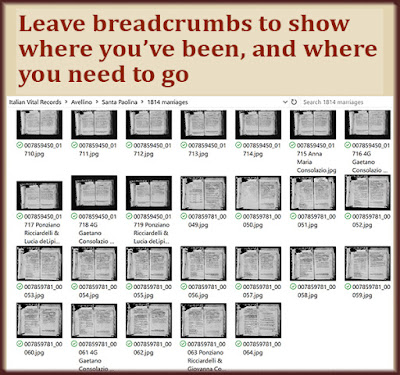Figuring out marriage customs can help you avoid making mistakes in your family tree.
Have you noticed that people today are getting married many years later than they used to? Years from now, genealogists will examine records and notice that shift.
Are you paying attention to the marriage facts and figures for your ancestors?
Age at First Marriage
Get familiar with the customs in the towns you're researching. While paging through marriage documents looking for your ancestors, take a look at the ages of the other brides and grooms.
In my ancestors' towns, all tightly arranged in Southern Italy, I saw the commonalities:
- first-time brides and grooms were usually very close in age to one another
- first marriages before the age of 22 were less common
- first marriages after the age of 28 were less common
Based on these facts, I decided to use 25 as my magic number. Twenty-five was the average age at which people in my towns were having their first baby. They'd get married at 24, and have their first baby at 25.
 |
| Don't know when they were born? A smart estimate will help your family tree. |
Adding "born about 1850" to the parents in your tree can help you understand who you're working with. It can stop you from even thinking about attaching them as the parents of someone born in 1920—even if they seem to have the right names.
Remarriage: How Soon and How Old/Young?
The people in my towns in 19th century rural Italy didn't stay single for long after their spouse died.
This is when you remember that most people didn't marry for love. So, 4 months after the death of their spouse, they're engaged to someone else. Can you imagine that today?
But it was a hard life. A man needed a woman to cook for him and raise his children. He would choose a younger woman (with more life to her?) and continue having children. A woman needed a man for support. She would choose a man with property or livestock or a good job. It was vital to their lives.
Before I figured this out, I was shocked to find that my 2nd great grandparents had a huge age difference. He was 46 when he married my 23-year-old 2nd great grandmother.
My first reaction was "ewww!" As I continued digging, I found his other children, his first marriage and his first wife's death. His new bride was born the same year as his eldest child. Were they childhood playmates? (Again, ewww!)
I found that my 2nd great grandmother's father died just 4 months after her marriage. Did they know he was dying? Did she need to marry to help support her mother?
Knowing what I know now, this big age difference wouldn't have shocked me. I would have assumed he was a widower and searched the records for his first wife.
- He married in 1927 at the age of 25.
- He was widowed at the age of 52.
- He remarried at the age of 57.
- They were too old for children, but they needed each other.
- He was widowed again at the age of 84.
- Marriage would have meant sharing his lifetime's fortune, but he did choose to live with a woman. (Despite not liking her cooking.)
If some of these norms hold true where your ancestors came from, be on the lookout for more marriages.
Families Intermarrying
My great grandfather and his brother married two sisters who lived close by. The two married couples lived across the street from one another for the rest of their lives. And when I say "across the street" I mean a few paces across the dirt path the mules followed.
I can imagine that the brothers' family (the Iamarino's) and the sisters' family (the Pilla's) each owned a parcel of land. Maybe their lands were literally across the mule path from one another.
But it gets better. Two more Pilla sisters—it was a big family—married two brothers from the Paolucci family. They all lived nearby. Maybe the Paolucci family had another parcel of adjacent land. It's a bunch of marriages of convenience working to twist my family tree into a wreath.
 |
| Marriages between families may have happened multiple times. |
It's helpful to have an understanding of the marriage customs in the place you're researching.
Oh, and be sure to find out if divorce existed in your place of research. Legally, there was no such thing in Italy until 1970—following a mandatory 5-year separation! Because of that, I know that a 45-year-old woman in an 1880 Italian marriage document is probably a widow. And her husband may have died only months before.




